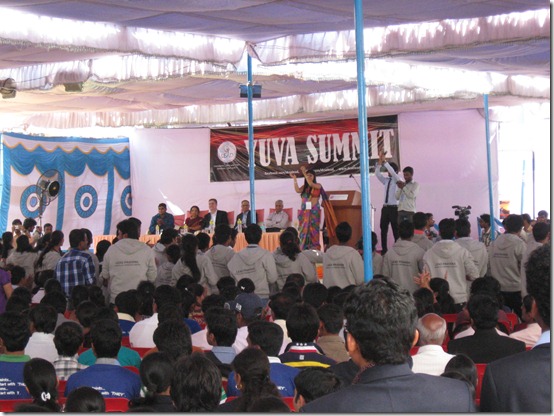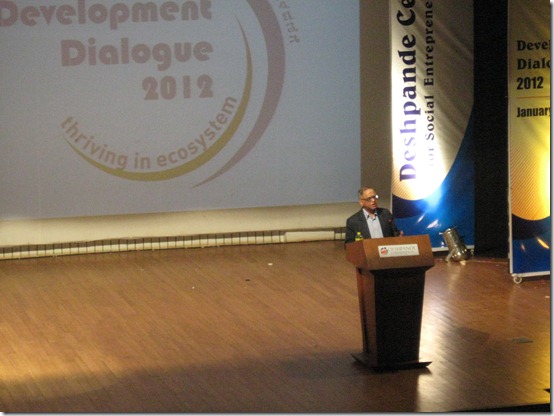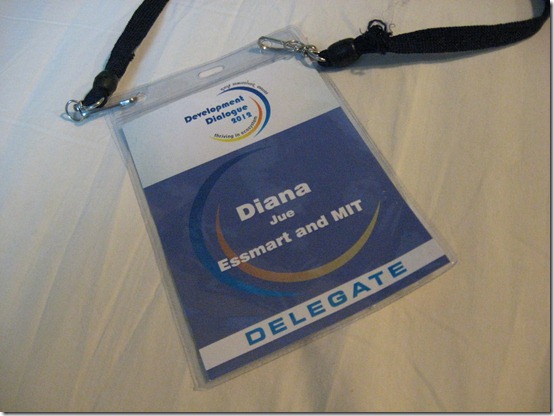The Deshpande Foundation was hosting its annual Hubli-based Development Dialogue, a conference that brings together social entrepreneurs from all over India (although mostly in the south). This year’s theme was “Thriving in Ecosystem.” Hubli is the location of the Deshpande Foundation’s Sandbox, and this sandbox imagery is supposed to elicit children’s innovative and enthusiastic playtime. The Deshpande Foundation, which is led by Guraraj “Desh” Deshpande, hopes to bring out innovation and enthusiasm to solving social problems on the ground. In his introductory address, Desh talked about the process of globalization that provides opportunities for every nation if it is willing to compete, the global passport of high quality education, commitment, hard work, sincerity, and discipline, the necessity of respect for each other and true secularism (in the Indian sense of the word), and climate change.
The keynote speaker was Infosys’ own N R Narayana Murthy, a household name throughout India. He is related to Desh through marriage, so that is why they both shared space on the posters that littered Hubli’s main streets. His message about social entrepreneurship had a few points:
- Money and infrastructure will follow a good leader.
- Have a very clearly defined objective (preferably just one). A lot of social enterprises get sidetracked when they try to do too much. Optimize a single variable function, and you’ll do much better.
- Create a roadmap for where you want to go in terms of the objective for 5, 10, and 15 years from now.
- Have very clearly defined key performance indicators (from 4 to 7 that you will constantly measure). What you cannot measure you cannot improve.
- Since we live in a global, interconnected world, you should benchmark yourself with the best global benchmark in your area of specialization.
- Think of your social enterprise as if it will be in existence for the next 200 to 500 years. Create an institution in which you can pass on leadership and a value system from one generation to another. Design systems for long life. Institutionalize processes and learn scalability. Go big.
- Microentrepreneurs should take the following into account:
- Provide low cost per unit products/services to the bottom of the pyramid.
- If you want to make decent sums of money, then make it. There’s nothing wrong with making money, legally or ethically. If you don’t make money, your enterprise will not go. You need to scale up your operations to make money.
- Given that your per unit cost is low for your product/service and you want to scale up to make decent profits, then you will need to cover a vast area. Distribution costs are very high, so you will need to innovate. [I believe that this is where Essmart comes in.]
- You must create a forced learning environment, which means that you need to implement a mechanism whereby people can learn from each other.
- Live in harmony with the government. Wherever you operate, it is your desire to make a better world. Government also plays a role in this, as it is supposed to represent society. Thus, if you want to make a big difference in society, you have to learn to live in harmony with the government.
- Learn to use data and facts in every argument/discussion. “In God, we trust. Everyone else, bring data to the table.”
- Characteristics of an organization that moves forward:
- Openness to ideas
- Meritocracy
- Skill
- Innovation and imagination
- Execution
- Have fun and enjoy your loved ones. “At the end of the day, without a happy mind, I don’t think you can make others happy.”
- Narayana Murthy’s definition of success: “Success is the ability to bring smiles onto the faces of people when I enter the room. I don’t need to be rich or beautiful. I just need to make the other person feel that I want to make his life better in whatever way I can.”
I did not know that Narayana Murthy was so quotable.
Lastly, I met up with a class of MIT students that was traveling around Delhi. They made it down to Hubli for this conference, and they were dead tired when I met them. We had the opportunity to meet with Ramji Raghavan, the founder of Agastya. Agastya is a foundation that is focused on bringing innovative educational practices to rural India. They have a lot of really cool hands-on science labs. Ramji spoke to us for some time about social entrepreneurship. I remember two things clearly: 1) Before you begin, survey a bunch of people and take note of what they say you cannot do. Then do what they say you can’t do. You’re likely to come across something good. 2) Indians are relational people. Remember this when you meet.




Follow Us!